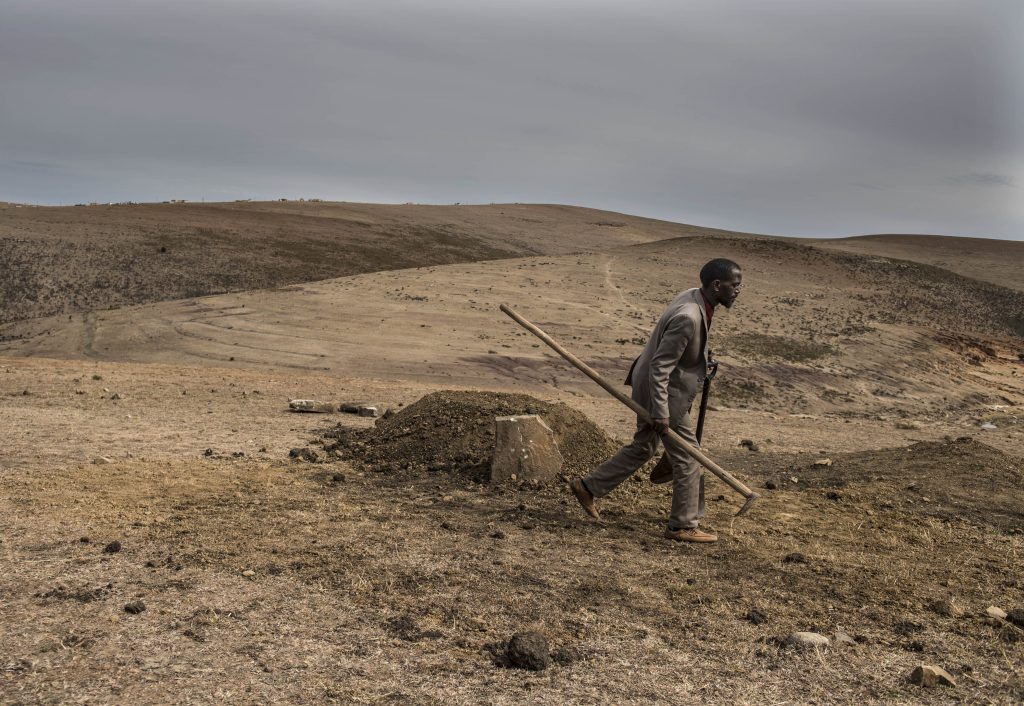Mementoes: A picture of Aviwe Wellem hangs on a wall at the homestead. (Paul Botes/M&G)
In August last year, Aviwe Wellem was raped and stabbed to death in her bedroom. It was a Saturday morning in Gxarha village in Dutywa in the Eastern Cape. The old woman who lived near her had not seen her that morning as she usually did.
That morning, Aviwe’s body was draped over her bed and blood had seeped into the duvet and the mattress.
Nine months later that is still all the family knows about the day Aviwe died. Her aunt Nokhanyiso Mbokoma, who brought her up, said she still mourns her niece.
“Every day is painful. It gets worse when I hear of other cases of young women like Aviwe still murdered and raped as if this is normal,” she said.
“Nothing will bring her back but closure is what we need. We need to know who did it and why.”
The police apparently took DNA from a number of men who were building at the house where Aviwe was murdered.
But nine months later the DNA results have still not returned.
One of the last people to see her alive, on the evening of August 31, was Nolungisile Mondileki, the old woman who lives in a rondavel in the same homestead. Last year the 96-year-old told the Mail & Guardian that the last time she saw Aviwe was the night before.
“The Friday night she died, she had come back from school a bit later than usual. The sun was starting to set if I remember correctly — the sheep were definitely back by that time,” she said back then.
“She came to greet me here. I asked her to not forget to close and lock the garage door of the main house. The builders had left it open when they left that morning,” she said. “Since the sun was setting, I came inside my rondavel and locked up. I got ready for bed and that was the last time I saw her.”
By the next morning, the sheep had already departed and Mondileki asked Oko Hleziphondo, the 19-year-old shepherd, to check why Aviwe had not come out of the house.
“It is unlike her to wake up so late in the day, so umakhulu asked me to go and check. The front door of the house was unlocked but when I reached her bedroom, it was locked. There was no key in the hole. Until today we have not found the key. I peered through the keyhole and saw a body on the bed.”
It took Hleziphondo about two hours to call his neighbour and break open the window and then the door. He found Aviwe in bed, covered with a blanket. When he uncovered her body she was naked and her arm was rested on her forehead, lifeless and wounded.
Aviwe was dead.
Four days after Aviwe was laid to rest in Dutywa, President Cyril Ramaphosa stood before a joint sitting of Parliament on gender-based violence to harshly condemn the siege women and children were under.
“There is a very violent and brutal war underway against the women of South Africa. Last year, 2 700 women and over 1 000 children died at the hands of another person,” he said. “Every single day the police receive over 100 cases of reported rape. South Africa is one of the most unsafe places in the world to be a woman, with levels of violence that are comparable to countries that are at war.”
The president added that the government would strengthen the criminal justice system to ensure that, among other things, the department of justice and constitutional development would work on clearing the backlog of criminal cases for rape and other forms of gender-based violence.
 Aviwe’s final resting place. (Paul Botes/M&G)
Aviwe’s final resting place. (Paul Botes/M&G)
Though Ramaphosa reiterated these same sentiments last week, as reports of more violent murders of women’s violent murders were reported, the reality is that nine months later some of these promises have still not been fulfilled and have a direct effect on the finalisation of thousands of cases, Aviwe’s being just one of them.
According to Captain Namhla Mdleleni, the police spokesperson in Queenstown, the Dutywa detectives are still investigating.
Aviwe’s aunt believes the outstanding DNA tests could help move the case forward.
“There are many cases here that remain unsolved while police have taken pictures and DNA. But here we are today without a single suspect. I am not sure if it’s just us in the villages or it’s because no one cares about people like us,” said Mbokoma.